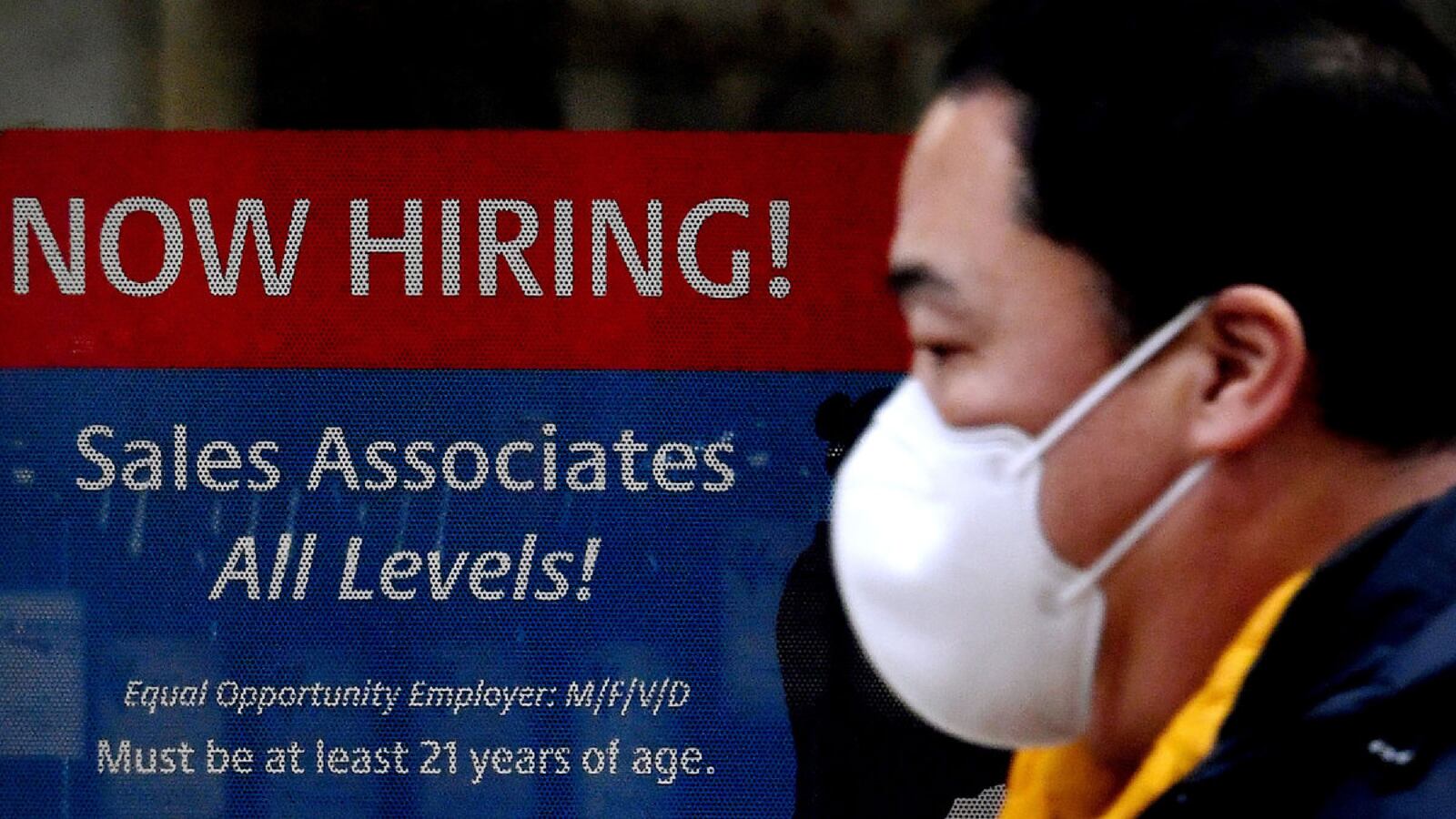You may have to wait in longer lines to get into that amusement park with the ride that makes you want to vomit. That tiki bar that builds your drinks just the way you like it may have shorter hours this summer. And that restaurant you love in town might have their wait staff serving more than their fair share of irritable customers.
That shortage in the service and hospitality world may affect when places are open and what they have to offer—throwing some post-pandemic shade on that hot-vaxxed summer you’ve been planning. So if you want to avoid disappointment when you travel this year, don’t assume you may be able to party like it’s 2019.
Las Vegas has been among the metro areas with the highest jobless rates over the last two months, and this problem goes beyond the number of Elvises that are available. Restaurants and hotels are struggling to be fully staffed in their return to normal. Some pools are facing a lifeguard shortage, which is not helpful if you want to avoid drowning.
In New Orleans, the story is no different.
“Yes, finding good talent for New Orleans’ hospitality industry is our number one priority right now,” Kelly Schulz, senior vice president of communications and PR for New Orleans & Company told The Daily Beast. New Orleans & Company is the official marketing organization for New Orleans tourism.
“As tourism begins to ramp up, some businesses who are short-staffed have had to change their hours and make other accommodations,” said Schulz. She adds that New Orleans is doing well on the COVID-19 front, and they are holding job fairs, but there is still a need to make sure “the city is fully staffed.”
The Midwest is also not immune to the crisis.
Cedar Point Theme Park in Ohio, for example, a popular destination for rollercoaster and waterpark lovers, is currently closed on Tuesdays and Wednesdays through most of June due to being short on staff.
“We want to be sure we are delivering fun and memorable experiences to our park guests,” Cedar Point said in a statement. “As we’re seeing across a wide range of industries, the availability of labor has been a challenge. In response, we have ramped up recruiting efforts and taken steps to ensure we are providing competitive wages and benefits.”
The debate around what is driving these shortages is center stage right now.
Controversial signs, for example, began popping up earlier in the year at businesses, frequently using modified boilerplate language claiming “Due to the stimulus money and tax time, people just do not want to work.” The $300 weekly federal stimulus benefit provided by the American Rescue Plan, some argued, disincentivized unemployed Americans from seeking jobs. The idea was picked up by half of U.S. governors, who are ending the federal $300 weekly benefit in June and July, rather than on September 6 as planned.
Montana Governor Greg Gianforte, for example, is among those Republican governors who see the problem as about pandemic relief incentivizing unemployment. He’s canceling the federal program in favor of awarding $1,200 to the first 12,500 people who find work and remain employed for one month.
Others contend many Americans may actually be re-evaluating their worth and futures. “The problem is not that people make too much on unemployment,” tweeted Robert Reich, former Secretary of Labor under President Bill Clinton, “The problem is that employers pay starvation wages.” The Bureau of Labor Statistics also points to businesses that closed as a result of the pandemic; it is hard to return to an employer that no longer exists.
Most destinations, however, do see the shortage as a complex conversation that requires rethinking strategies.
In a state like Montana, which is home to popular national parks, that shortage will have an impact on what is expected to be a robust summer crowd.
“We are definitely experiencing worker shortages and some local businesses are making adjustments to service and operating hours,” Dylan Boyle, the executive director of Explore Whitefish told The Daily Beast. Whitefish is a gateway town for Glacier National Park in Montana.
“Visitors need to research, plan ahead, and have a backup plan,” said Boyle. “Many people don’t realize that we do not market summer travel to Whitefish.” The reputation of the area focused on the national park is enough to pack the region out, letting them focus on marketing for October through April.
Planning ahead, which is good advice for any trip, is especially good this year given the labor shortages. And due to Glacier already facing overcrowding, the park now requires advanced tickets if you plan to drive its iconic Going to the Sun Road. In other words, this year is not a 2020 do-over.
Everything from the desire to change careers, unemployment benefits, an “affordable workforce housing crisis in Whitefish,” and “shortage of childcare,” all might be contributing to the gap in labor, Boyle added. “It’s a complex set of circumstances and I don’t think there is a quick and easy solution.”
There are moves to fill up jobs in Whitefish, however. “Local businesses are offering hiring incentives to workers — higher wages, signing bonuses, and rewarding their existing workforce in order to retain them,” said Boyle.
On the other side of the country in Savannah, Georgia, the story is no different.
“We absolutely are experiencing the same kinds of labor shortages that our industry and many others are facing from all around the country,” Joseph Marinelli, president of Visit Savannah in Georgia, told The Daily Beast. Visit Savannah also represents Tybee Island.
“We’re in our peak tourism season right now,” said Marinelli, “so, you know, businesses are working hard to stay open seven days a week,” but, he said, they are also working hard “to compensate and adjust.” Some businesses in Savannah are shortening their hours slightly and a “small handful” of restaurants are closing on Mondays.
Marinelli still sees Savannah tourism as doing very well compared to 2019. “I said to my staff this morning that, you know, when you combine COVID fatigue, and pent up demand, and vaccination distribution, and then the great weather that Mother Nature has been providing to us, you know, it’s really the perfect formula for an increase in tourism.”
For popular resort towns with a small population, the labor pinch is hitting very hard.
“Staffing is always a challenge here,” said Denise Beckson, vice president of human resources for Morey’s Piers in Wildwood along New Jersey’s boardwalk beaches. Wildwood is a resort area with a small population and there are generally not enough high school graduates in the area to fill the 1500 seasonal openings. Even so, she says, “what we’re facing now is unprecedented.”
Beckson believes there are many factors involved in the shortage, such as fewer foreign exchange students to hire, individuals uncomfortable with the state lifting the mask mandate, and teens staying home to help manage their siblings while their parents work from home.
“Some may make more on unemployment, some may make less,” Beckson adds, “but they’re not working and so they say, ‘okay it’s not as much as I was making, but it’s enough to survive.’” In New Jersey the maximum unemployment benefit is around $700. If you add “$300 on top of that for the Federal supplement,” Beckson said, “somebody is getting $1,000 a week to stay home.”
This is a perspective shared by the Greater Wildwoods Tourism Improvement & Development Authority.
“I would characterize the need in the tourism industry right now as a whole, not just at Wildwoods, but throughout the entire industry, as being at a critical point,” said Ben Rose, director of marketing and public relations for the Greater Wildwoods Tourism Improvement & Development Authority and vice president for the New Jersey Tourism Industry Association.
Rose said that there is high demand right now and pre-season reservations have been double that of 2019. Their guests, he added, are used to “a high degree of customer service,” so the shortage of workers is concerning, noting there will be longer lines and adjusted business hours this year.
“We feel it would be better to apply that additional $300 a week to the employers of these businesses to give out as bonuses, or as increased subsidies and increased salaries to people accepting jobs, than to give it to people on unemployment.” He recognizes that there are those who are looking and can’t find jobs, but he sees these as management positions rather than an entry level opening.
Additionally, Rose believes that the unemployment rule, which requires those receiving benefits to prove they are looking for work, isn’t being enforced.
In the meantime, Morey’s Piers has been advertising and offering incentives, such as increasing pay, season passes, and schedule flexibility. As one solution to the worker shortage, Morey’s Piers decided to take a creative route: hire performing arts students.
Working with a talent staffing company in New York, which normally places performing arts students — singers, dancers, actors — in cruise ships, or amusement parks, and off-broadway performing, Morey’s found a way to hire staff and help the students hone their craft.
“They’re not just selling pizza at the boardwalk,” Beckson said, “they’re adding a layer of performance to that — they’re adding an experience to that, so that they get to start to really hone their performance skills, we fill our position, and the guest has a really memorable experience.”
Despite this shortage, it is not that workers aren’t seeking and finding jobs.
While April’s jobs numbers were disappointing, leisure and hospitality — which gained jobs three months in a row — did recover 331,000 jobs. That is more than any other sector in April. The May jobs report released Friday showed that the U.S. added 559,000 jobs, which is stronger than April, though not as high as the 670k+ that were expected. Leisure and hospitality still were the most notable additions, which made up 292,000 jobs.
People are getting back to work, even though it is not by 2019 standards.
“You have to recognize that people have been taking care of loved ones at home and homeschooling. And, you know, have been challenged in ways that in the past they weren’t challenged,” said Joseph Marinelli. He believes, though, that will all eventually change and people will get back to work again, because “Lord knows there’s plenty of jobs available.”

